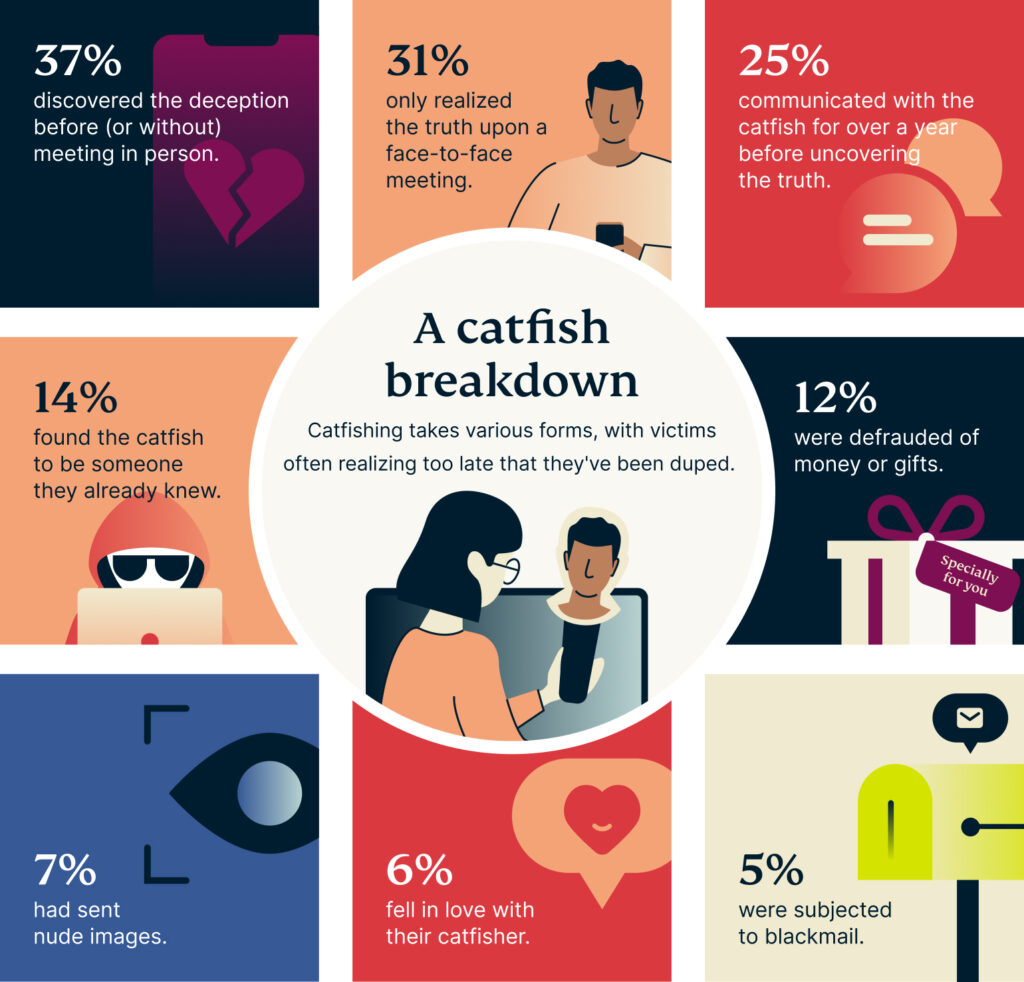Meanwhile, 1 in 3 respondents admit to creating fake dating profiles, and 1 in 4 acknowledge using AI to enhance their photos
LONDON, UK. December 7th, 2023 – Almost a quarter (22%) of Brits have fallen victim to catfishing in their lifetime, with a staggering 31% of victims having met their perpetrator in person, only to find out they weren’t who they said they were. This is according to a recent national survey conducted by ExpressVPN, a leading consumer privacy and security company.
The survey of 2,000 people aged 18 to 50 across the UK exposes the dark side of social media and online dating, including catfishing (when someone creates a fake identity online to deceive individuals), AI deception and revenge porn fears. According to the survey, almost half (49%) of Brits say their awareness of catfishing as a personal threat has increased over the past 12 months, and being catfished (56%) is now among the main risks associated with online dating, only surpassed by the risk of meeting someone dangerous (62%). Other concerns around online dating specifically include being harassed (39%), being sent explicit images (30%) and personal information being revealed (26%). And their fears are not irrational, with the majority of those currently dating online in the UK admitting to being catfished at least once (54%).
This research comes on the back of the news that the Home Affairs Committee has announced a new inquiry into fraud, following claims that social media platforms are failing to tackle the issue on their platform, including the increased frequency of romance scams. Though catfishing can happen to anyone, ExpressVPN’s survey reveals that 18-24 year olds are most at risk of catfishing, with 34% of 18-24 year olds having been catfished, followed by 27% of 25-34 year olds, 18% of 35-44 year olds and 7% of 45-50 year olds. What’s more, the survey reveals that men are more likely to fall victim than women, with 24% of men having been catfished compared to 20% of women.
Catfishing can occur on any social media or online dating platform, but the survey reveals the platforms where the most cases have been reported:
- Facebook 35%
- Tinder 31%
- Snapchat 26%
- Instagram 25%
- WhatsApp 16%
- TikTok 14%
- Bumble 12%
- Hinge 8%
- X 8%
- Reddit 3%
While 37% of catfishing victims said they realised the perpetrator wasn’t who they said they were before meeting in person, almost one third (31%) of victims met them in person, only to find out they weren’t who they claimed to be. In addition, a quarter of victims were speaking to their perpetrator for more than a year before realising they were a catfish, and 14% found their perpetrator to be someone they knew in real life. Sadly, more than one in ten (12%) victims were scammed out of money or gifts.
As well as financial loss, being catfished can cause serious mental health concerns, such as anxiety and depression. The survey reveals that 39% of those who were catfished felt embarrassment and regret, 36% were emotionally devastated, 27% did not want to look for love again, and 17% said it caused them mental illnesses such as anxiety or depression. A further 16% did not want to tell family or friends. It is therefore no wonder that the rise in catfishing has put almost a third (28%) of Brits off using social media and dating apps to meet a partner.
By their own admission, Brits’ own cheeky habits are also raising security concerns, too. Almost half (43%) of Brits admit to having sent nude images to someone, with 15% of these respondents saying they are now worried about being blackmailed, and a further 13% worried the images are floating around the internet without their knowledge. 15% said they are worried the images will get sent to their family, and one in ten are worried they’ll be sent to their employer. This follows reports of 10,000 calls and online reports to the Revenge Porn Helpline in the UK in 2023 alone—31% higher than the same period last year.
Alarmingly, more than a third (34%) of Brits admitted to creating a fake profile or pretending to be someone else on social media/dating apps. The main reason for doing so was to improve their dating life (10%), to find out if their partner is cheating on them (9%) or to check up on their ex (8%). Furthermore, more than one in four (28%) Brits have admitted to using AI to enhance dating or social media profiles, mainly to enhance their photos (15%) but also to enhance their biographies (14%) and to improve their chat up lines (12%).
Lauren Hendry Parsons, Privacy Advocate for ExpressVPN commented:
“With the emergence of social media and dating apps came the catfishers—scammers who create a fake persona, complete with attractive photos, to form relationships with strangers predicated on lies. We live so much of our lives online now that it’s not unusual for our first connection with someone to be virtual, including with potential employers, colleagues, bank and retail support staff. There is therefore an element of trust we as individuals have when talking to someone online—a lot more so than a decade ago.
“But sadly there are many bad actors out there preying on this trust, often for financial gain. The growing sophistication of AI and ease of generating false identities has threatened that trust even more. If you suspect you’re getting catfished, report the person to the dating app or social media platform and indicate precisely why you think they’re a possible catfish. There are also several additional security measures you can take when online. For example, using a high-quality VPN can add an extra layer of security to your online interactions. By masking your IP address, a VPN helps protect your location and identity, helping your online activities remain private and secure.”
For more information, please visit: https://www.expressvpn.com/

